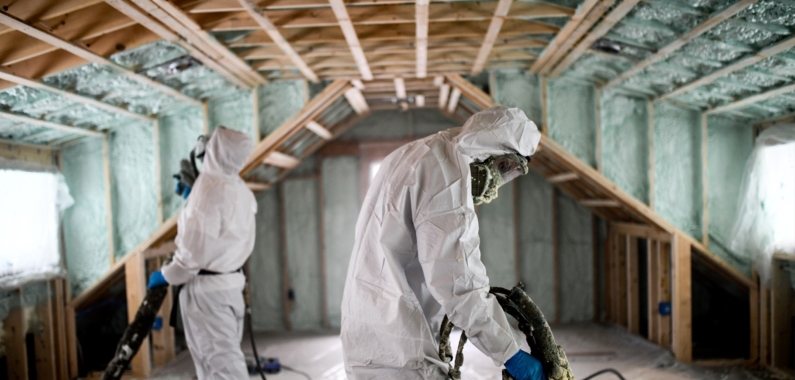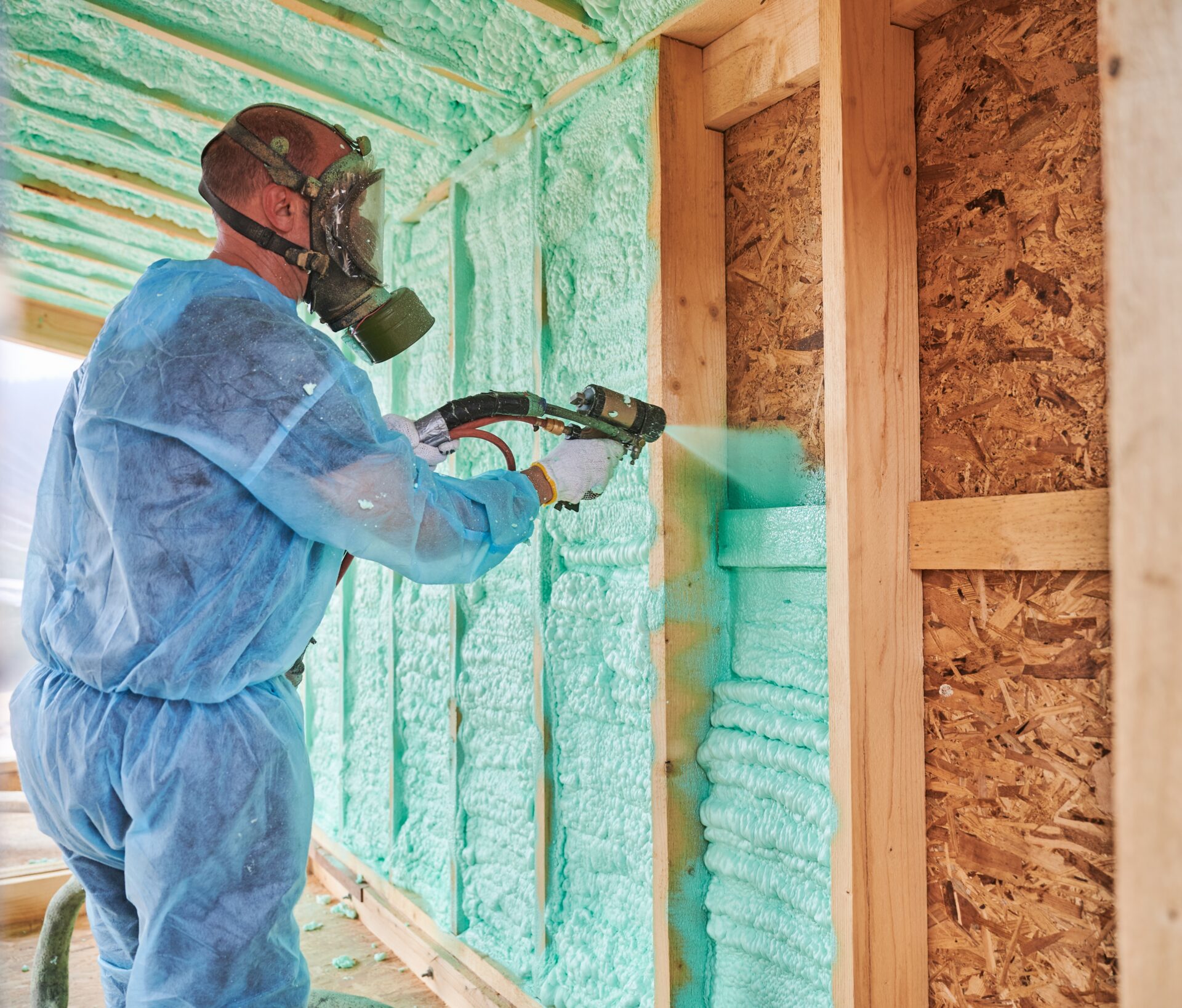Contrasting Spray Foam to Conventional Insulation: Which Is Much better?
Contrasting Spray Foam to Conventional Insulation: Which Is Much better?
Blog Article
Just How Spray Foam Can Enhance Power Effectiveness in Any Kind Of Structure
Spray foam insulation has actually arised as a critical remedy for improving energy effectiveness across different building kinds. By creating an airtight seal that decreases air leak, it properly manages interior climates while substantially lowering cooling and heating costs. Its excellent R-value and moisture-resistant residential properties contribute to lasting power cost savings and improved building long life. As home proprietors progressively look for lasting services, the implications of spray foam insulation expand past mere energy financial savings. The full extent of its benefits, however, warrants a closer exam of exactly how it can change power administration approaches in both domestic and commercial setups.
Understanding Spray Foam Insulation
Spray foam insulation is significantly recognized for its remarkable thermal performance and convenience in numerous applications. Composed mainly of polyurethane, this insulation product is used as a liquid that broadens upon get in touch with, filling spaces and creating a smooth barrier. This unique residential property allows spray foam to comply with uneven surface areas, making it a perfect option for both industrial and household structures.

Application of spray foam insulation is usually done by trained specialists utilizing customized devices, guaranteeing optimum performance and safety and security - Spray Foam. The treating process is fast, allowing for quick installment and marginal disturbance. As an outcome, spray foam insulation is significantly being employed in new construction and retrofitting tasks as a result of its ability to boost structural honesty while improving general power performance in buildings
Advantages of Power Effectiveness
Power efficiency plays a critical duty in lowering operational costs and decreasing environmental impact across different fields. By enhancing power use, homeowners and businesses can accomplish significant cost savings on utility bills, which straight enhances economic performance. Efficient power intake implies less reliance on fossil fuels, thus adding to a decrease in greenhouse gas exhausts and advertising a more lasting setting.
Moreover, energy-efficient structures often experience boosted residential property values. As power prices climb and sustainability becomes a top priority for consumers, homes with improved energy effectiveness features are extra appealing on the marketplace. This fad encourages investment in energy-saving modern technologies, which can further drive advancement and economic growth.
In enhancement to ecological and financial benefits, power performance can likewise boost the overall convenience and health and wellness of interior rooms. Proper insulation and effective cooling and heating systems aid keep constant temperature levels, decreasing drafts and humidity degrees, which in turn can lead to much better interior air quality.
Inevitably, the benefits of power performance extend past instant cost savings, fostering a resilient economic climate, advertising ecological stewardship, and enhancing the lifestyle for residents in any structure.
Exactly How Spray Foam Works
Commonly applied as a fluid, spray foam increases quickly upon contact with surface areas, developing a solid obstacle that properly secures gaps and fractures. This one-of-a-kind residential property results from its chemical make-up, primarily including isocyanates and polyols, which react when mixed to create a foam that fills gaps and sticks to different products, including steel, concrete, and timber.
As soon as used, the foam expands to a number of times its original volume, making certain a tight seal that stops air leakage. This process substantially minimizes thermal bridging, which occurs when warm transfers via materials, resulting in energy loss. The foam's high R-value, a measure of thermal resistance, adds to improved insulation by minimizing heat transfer in between the interior and outside environments.
Furthermore, spray foam is resistant to wetness and pests, better improving its effectiveness in keeping power performance. Its application can be tailored to various locations, including attic rooms, wall surfaces, and crawl spaces, enhancing insulation across a building. Spray Foam. In general, the ingenious layout and application method of spray foam make it an efficient service for improving energy efficiency in any structure, causing decreased power expenses and an extra lasting developed setting

Applications in Numerous Buildings
Countless applications of spray foam insulation can be found across numerous structure kinds, enhancing energy performance and convenience. In residential homes, spray foam is frequently used in attics and wall surfaces to develop a seamless barrier against air leakages, dramatically lowering heating and cooling demands. This application is specifically useful in older homes, where standard insulation might be inadequate.
In industrial buildings, spray foam insulation is used to roofing systems and exterior walls, which aids to enhance thermal performance and shield against moisture invasion. Its lightweight nature makes it a suitable selection for retrofitting existing structures without including substantial weight. Additionally, spray foam can be made use of in industrial settings to shield pipelines and tank, keeping temperature level control for sensitive products.
Institutional structures, resource such as healthcare facilities and colleges, benefit from spray foam insulation by making sure a consistent indoor climate that supports occupant comfort and health. The convenience of spray foam permits it to adapt to various building sizes and shapes, making it a favored selection for architects and home builders seeking get more efficient insulation remedies. Overall, spray foam insulation works as an important component in attaining energy-efficient structures across all fields.
Long-Term Price Cost Savings
Spray foam insulation offers considerable long-term cost savings for building owners and occupants by lowering power consumption and reducing energy costs. By offering an exceptional air seal, spray foam decreases the infiltration of outdoors air, therefore enhancing the thermal performance of a structure. This causes a lot more efficient heating and cooling processes, which can lead to considerable decreases in energy costs with time.
Along with instant savings on utility bills, the toughness and durability of spray foam insulation add to its economic benefits. Unlike typical insulation materials, which might droop, settle, or degrade, spray foam maintains its performance for decades, reducing the demand for regular replacements or repairs. This longevity equates to lower maintenance expenses and much less disruption for owners.
Furthermore, structures outfitted with spray foam insulation typically delight in a boost in residential property worth, making them extra appealing to possible purchasers or renters. As energy efficiency becomes progressively prioritized, properties with efficient insulation services stand out out there. Eventually, the integration of spray foam insulation not just boosts comfort yet also represents a strategic investment that generates considerable economic benefits over the long-term.
Final Thought
To conclude, spray foam insulation serves as a crucial part in boosting energy performance across varied structure kinds. Its capacity to develop a smooth obstacle against air leak, incorporated with Source high R-values and moisture-resistant homes, dramatically lowers energy consumption and linked prices. The execution of spray foam not only adds to regular indoor temperatures however likewise increases property worth, highlighting its duty as a sensible investment for both household and industrial residential or commercial properties.
Spray foam insulation has actually emerged as a crucial solution for improving energy efficiency across various building kinds. Spray Foam. As a result, spray foam insulation is significantly being used in brand-new building and retrofitting jobs due to its ability to enhance structural integrity while boosting overall power efficiency in structures
Generally, the ingenious style and application technique of spray foam make it a reliable service for boosting energy effectiveness in any kind of framework, leading to lowered energy prices and an extra sustainable built atmosphere.
Numerous applications of spray foam insulation can be discovered throughout numerous building kinds, improving power effectiveness and convenience.In verdict, spray foam insulation offers as a vital element in boosting power performance throughout varied structure kinds.
Report this page